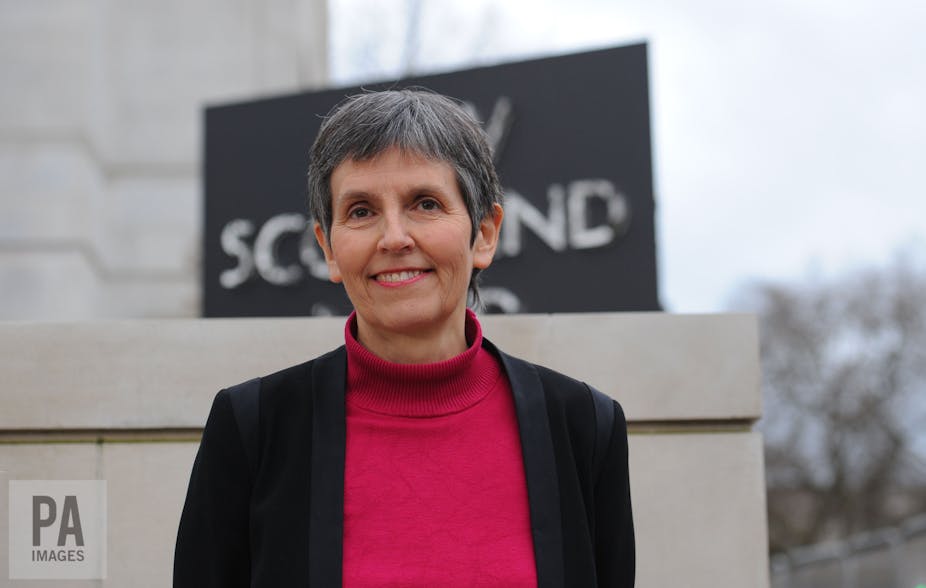Cressida Dick has been appointed the first female commissioner of the Metropolitan Police. Now, for the first time, the three top police officers in the UK are women: the Met commissioner, the head of the National Crime Agency, Lynne Owens, and the Chair of the National Police Chiefs’ Council, Sara Thornton.
The Metropolitan Police Service is one of the largest police forces in the world – and some would say the most famous. The question as to who would succeed Sir Bernard Hogan Howe to become the next Met commissioner has been a hot topic of conversation for weeks. Four strong candidates, all good cops – including Thornton – fought it out to the finish. The final decision was taken jointly by the home secretary, Amber Rudd, and the mayor of London, Sadiq Khan. They were advised by Sophie Linden who heads the Mayor’s Office for Policing and Crime (MOPAC).
The new commissioner is likely to be a popular choice in most quarters – but not all. There will be much discussion about her role as the senior commander in the control room during an operation in 2005 during which Jean Charles de Menezes was tragically shot by a police officer on an underground train – although she was cleared of any personal responsibility by an inquest jury.

Her record of service in the Metropolitan and Thames Valley forces is distinguished and she brings a wide range of operational policing, knowledge of London and experience of dealing with government.
But is that enough? Taking on a 45,000 strong organisation, with a budget of more than £2.5 billion, that is under severe pressure would stretch the most seasoned corporate executive. Yet the House of Commons’ Public Accounts Committee in September 2015 made some pointed criticism of general management skills and training within the police force. Even with the support of MOPAC it is a monumental corporate management challenge.
Added to that, behind the still generally strong reputation of the Met – which, in my opinion, was arguably just maintained rather than either enhanced or eroded by Hogan Howe – lie many deep challenges.
Facing challenges
First, who would want two bosses? Once again, the commissioner’s two overseers, the London mayor and the home secretary, come from different political parties. The commissioner is operationally independent but the dual reporting line will require both deft and politically astute handling. Dick will have to win and maintain the confidence of both without making the mistake of getting too close to either. Perhaps having to look in both directions will help the commissioner avoid the risk of becoming too political, which not all her predecessors have avoided.
Next is the high risk in every direction from the Met’s many complex investigations and operations, as well as the daily severe threat from terrorism. The Metropolitan Police, which leads the British counter-terrorism policing effort in partnership with MI5, has to be on top form all the time. It is a formidable task but one that is at least familiar to the new commissioner from her previous role heading this area of the Met’s work.
The legacy issues which still dog the force may well be tougher. Enquires, including those following the investigations into the murder of Stephen Lawrence, damaged relations with the press, a string of allegations of sexual offences by public figures, as well as the shooting of Mr Menezes resulted in criticism being heaped on to the Met. Deep concerns remain over other past activities, such as the conduct of undercover operations – and it’s hard to imagine that the new commissioner won’t have to deal with more skeletons in the cupboard.
Monumental task
Managing the Met’s everyday performance issues will be more familiar to her, but nonetheless difficult. The force has very recently felt the heat from Her Majesty’s Inspector of Constabulary (HMIC) in respect of child abuse investigations. More than three-quarters of the large sample of cases looked at by the HMIC were found to be inadequate in one or more respects. This may well point to issues around systems, processes, detective skills, training and – importantly – an unswerving focus on the victims of crime. Putting all of this right across such a huge organisation will be tough.

The list of challenges is long, but one remarked on by Hogan Howe will be an immediate one for Cressida Dick. How to rebuild the broken technology police in London have to work with? She will have to pick up the pieces of repeated attempts to crack this difficult nut. Does the training and development any senior police officer receives equip them for such a role? The evidence is not strong that it does.
Perhaps most importantly, the new commissioner has to build a clear vision for her workforce – what she expects of them and, crucially, how they should police. How they should exercise their powers and discretion in a way that will ensure that across London, the Met is truly well connected with the communities it serves and wins their trust. Dick must also build a leadership team that will work together to build the culture that needs to permeate as quickly as possible to all corners of the force. Without that, the traditional model of policing London with the consent and support of its citizens will erode further.
No one person, even supported by a good team, can get it all right and her options for manoeuvre will often be constrained by external events. Getting the right approach to meeting what looks like a near-impossible challenge may well serve her best. This must involve being open, transparent, honest, utterly professional, caring of the public and employees and – when necessary – challenging of political pressure. Cressida Dick deserves support in this vital, but perhaps too demanding role. Even though she may well have been the best candidate, she will need that support.

